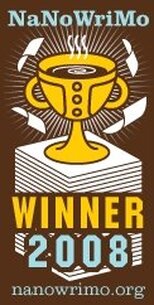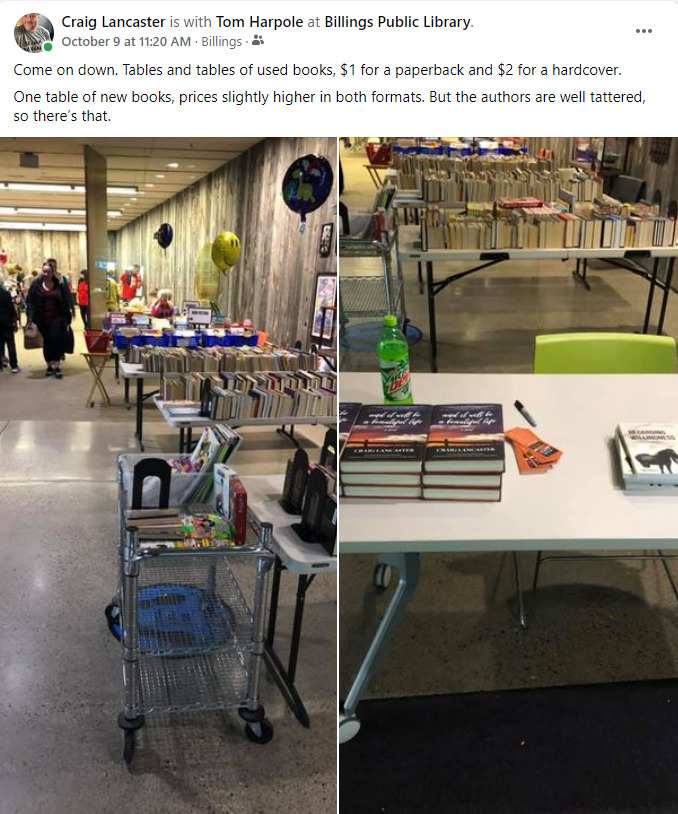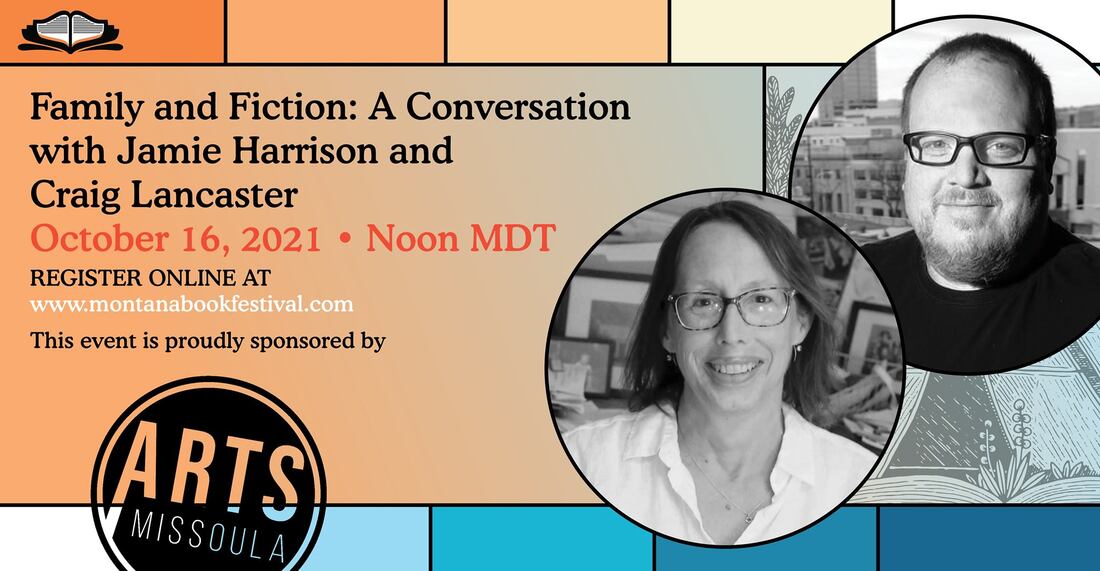|
10/17/2021 0 Comments NaNoWriMo … No. But It Ain't Snobbery.The rustling around of some of my writer friends tells me November is coming, and that means National Novel Writing Month (NaNoWriMo). And sure as the swallows return to San Juan Capistrano, someone (or several someones) in my circles will openly disdain the whole exercise. If I wished to be casually dismissive of someone's point of view—to suggest that they haven't legitimately arrived at their thinking—I could certainly do that, but I think not hearing each other has caused us enough problems. My own view is that a communal writing experience, in which thousands upon thousands of people set aside some time and try to create something, is very much a good thing. Perhaps the attendant expectations often get wacky—no, you're probably not going to write a finished novel in a month, and no, laying down 50,000 words and "winning" NaNoWriMo doesn't ensure publication, and no, the act of drafting is not what it's all about—but the expectations aren't the toil or the making of art. You want to spend November trying to pull a novel out of yourself? Bully! Do it! I won't join you, though, for reasons I'll get into below. And my getting into them might just illuminate what a NaNoWriMo participant can expect from the experience. On the other hand, what do I know and who am I to say? Well ...  1. I've Been There and Done That In 2008, prompted by my friend Jim Thomsen, I committed myself to a month of writing and had what has turned out to be a dream trip. I drafted my first novel, what eventually became 600 Hours of Edward, in those 30 days. (Actually, it was 25. No, no, wait, it was 17 on account of the off-days; see the breakdown below.) This, a bit regretfully for me, has become a sort of boilerplate in any account of my subsequent fiction-writing career. It shows up in reviews, gets asked in interviews, etc.: Here's the guy who wrote his first novel in 25 days and got it published and it eventually became an international bestseller and it's just that easy! It's not just that easy. I've written nine books since then, not a one of them as commercially successful as the first, all of them better pieces of writing (in my estimation), and I've come to view what happened in November 2008 as a one-off, a writing project never to be replicated by me in quite that way again. I had an idea, I gave in to the mania of writing it as quickly as I could because of the format, and I had the good fortune of writing something that has connected more broadly than anything I'd written before or am likely to write again. I'll take the win and say I've already played the game. 2. For Me, It's About Not Writing as Much as It is About Writing NaNoWriMo's pitch to prospective participants is pretty irresistible: They say we all have a novel inside us. Commit yourself to finding out. As far as it goes, a fine idea. And every November, people find their people, fellow writers who are trying to meet the challenge. There are supportive text exchanges and writing get-togethers and coffee klatches, and these are all wonderful things. Writing can be such a solitary, doubt-filled endeavor. NaNoWriMo brings community to the fore. The thing is, writing novels has helped me learn to embrace the solitude. It's also made me realize that some of the best work I do happens when I'm not at the keyboard, pushing my word count ever higher. It's in the quiet consideration of things, reflecting on the characters and worlds I'm trying to create. It's in feeling the rhythm of the world around me and participating in it. It's in letting the well refill. All of which is to say that ginning myself up for a writing dash in November is far less important to me than listening inward and doing the things I need to do to stay engaged with my work and with the larger life I have that supports it. 3. The Whole Word-Count Thing OK, look, I get it: NaNoWriMo is selling "get that novel out," so there has to be an attendant metric by which you measure how successful you were in meeting the challenge. Word count is just so lacking in so many ways because it puts the wrong objective forward. I can't speak for professional writers who disdain NaNoWriMo—by now, I should be on record as very much pro-the-spirit-of-NaNoWriMo-if-not-necessarily-the-way-it's-sometimes-applied. But many people who've spent a lifetime developing craft, absorbing rejection, trying again, getting better, breaking through will view word count as one of the least important things they do, far less vital than getting the arc right (which will, by its nature, produce the words), clarifying theme, achieving empathy, sharpening the prose, etc. That NaNoWriMo considers 50,000 words success can just feel a little thin when you know just how hard it is to write something worth publishing. For what it's worth, here's how my word counts proceeded in 2008 (first number is the cumulative total, and the parenthetical is that day's work):
I look at those totals now and feel sheepish that I felt compelled to keep the record and to commemorate it. Why? It wasn't the total that was driving me; it wasn't the prospect of "winning" NaNoWriMo so I'd have a cool pixelated badge I could post here 13 years later. I wrote like mad because I had inspiration on the hook, and having never written a novel previously, I didn't trust myself to let it come to me in a more moderated way. I cannot conceive of an 8,000-word writing day now. I'd probably collapse if I tried it. But here's the truth: I'm no less excited about my current project than I was about the book that became 600 Hours. I just don't feel the need to sprint. Thus, NaNoWriMo's appeal is lessened. 4. So What To Do?
This ain't a hard question. Do NaNoWriMo, if that's what you're jazzed about doing. Don't if you're not. Whatever the choice, I'd urge reconsideration of what success is, in literary terms. Success is writing that story, in whatever way you do it and in whatever time it requires. That's it. It's a singular success that stands alone from getting an agent, getting a publishing contract, seeing your story in print, selling a hundred gajillion copies. Success is doing the work. Period. Full stop. My buddy Jonathan Evison, one of the most talented and generous writers I know, wrote some number of novels and buried them in his backyard long before he broke through to publication. They weren't wasted effort; indeed, Johnny would tell you that work was foundational to everything he does today. The man speaks the truth.
0 Comments
10/13/2021 1 Comment Social ... and Socially DestructiveFirst thing: I'd be gratified if you'd go to this link, where my wife, Elisa Lorello, keeps her newsletter. She's written eloquently and emotionally this week about her pullback from social media: why she did it in the first place, ways in which she has come back, and why she'll never return to what her presence used to be. She gets at a lot of the things I've wrestled with, and she's been far stronger than I have as far as making some of her resolutions stick. If you like what you read there, you might consider going to her website and signing up for the weekly (sort of, kind of) dispatch. A little Elisa in your in-box is a day brightener, and we all need those. The truth is, we've been grappling with social media and its impacts on us, on how we congregate and communion and deal with each other, for as long as we've been becoming friends with Tom and booking staterooms on the S.S. Zuckerberg. It's just that the more pernicious aspects of an online life have been slower to come to us, and by the time they do, we're already addicted to the cat pictures and the easy reconnection with high school friends and the ready microphone for whatever is on our minds. (On mine, mostly: breakfast.) Every time I'm about ready to declare social media, on the whole, a net negative, I can feel a "yeah, but" bubbling to the surface. Over the weekend, I shared a table with Tom Harpole (author of Regarding Willingness, a great book you should read posthaste) at a library book sale, and we had a humdinger of a time building a genuine human rapport out of a friendship that had, to that point, been nurtured entirely online. So, if I'm ready to bag social media—and I am, baby, I am—am I also ready to foreclose the possibility of future Harpolian friendships? Um ... What about the genuine, deep love I've come to feel for people from my hometown I didn't know that well the first time around (I went to a big-block-store of a high school, so it was mathematically impossible to do it any other way)? What about the book club in Virginia who'd all be my besties if we lived closer? What about a dozen other examples I could rattle off without even contemplating it? I think the greatest disappointment of social media, for me, is that I thought (naively) it would be a tool of greater connection and empathy, and in its worst iterations, it's been precisely the opposite. I cringe when I look back on something like this interview, in which I extolled the virtues. They're so much harder to see now. And look, I don't think the problem is the technology, per se. We've leveraged new tools in our communication since human history began, from grunts to cave wall drawings in ochre, from plumes to pencils to printing presses to pixels, from phones that share party lines to phones with long-distance tolls to phones that aren't even used, primarily, as talking devices. But connection was the point, right? And now, in ugly and pervasive ways, the point is division. Harp said something while we were together, a grand occasion that I think will leave us demanding more like it to keep oxygen flowing in the friendship, and I haven't been able to shake it since: "The world is getting to a place where an empathetic person will find it impossible to live here." (I hope that's near enough to a direct quote. I wasn't taking notes, just reveling in the fellowship.) I think that's it, in large measure. Empathy is lifeblood for me. I can't imagine getting through my days without it. I can't imagine living in a way that I don't strive for it. I can't imagine wanting to be here without it. I'm going to try to live where kindness lives, to plant it where I am and where I'm headed. I'll fail sometimes, of course. That's part of the human bargain. But that ideal has to be the north star, or what are we doing here? (And, yeah, I get the irony of having pounded this out on a website, the link to which I'll distribute on Facebook and Twitter. We're hardwired for hypocrisy.* All of us.) (* — Credit to the great Barry Eisler for highlighting the Niebuhr passage.) Quick programming noteNovelist Jamie Harrison and I are doing this online conversation, hosted by the Montana Book Festival, about fiction and families. I think it's going to be a lot of fun with some interesting insights, and if you have some time Saturday (Oct. 16), I'd be well pleased if you joined us. The event is free, but you have to register here to get a spot.
|
About CraigCraig Lancaster is an author, an editor, a publication designer, a layabout, a largely frustrated Dallas Mavericks fan, an eater of breakfast, a dreamer of dreams, a husband, a brother, a son, an uncle. And most of all, a man who values a T-shirt. Archives
July 2024
By categoryAll 600 Hours Of Edward And It Will Be A Beautiful Life Awards Books Bookstores Community Connection Craft Craig Reads The Classics Dreaming Northward Education Edward Adrift Family Geography History Libraries Memory Montana NaNoWriMo Northward Dreams People Plays Poetry Public Policy Q&A Social Media Sports Stage Texas The Fallow Season Of Hugo Hunter The Summer Son This Is What I Want Time Travel Work Writers Writing Archives
July 2024
|


 RSS Feed
RSS Feed